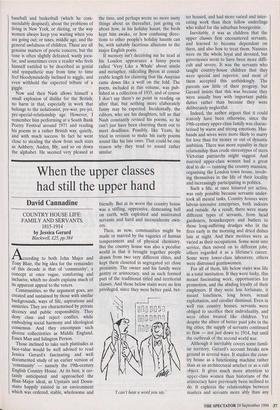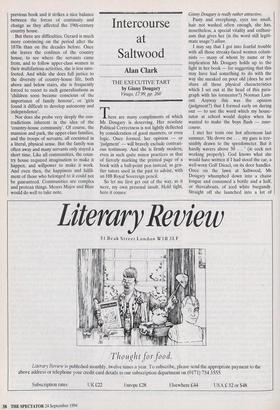When the upper classes had still the upper hand
David Cannadine
COUNTRY HOUSE LIFE: FAMILY AND SERVANTS, 1815-1914 by Jessica Gerard Blackwell, £25, pp.384 According to both John Major and Tony Blair, the big idea for the remainder of this decade is that of 'community', a concept at once vague, comforting and inclusive, which no doubt explains much of its apparent appeal to the voters.
Communities, so the argument goes, are created and sustained by those with similar backgrounds, ways of life, aspirations and anxieties. They are characterised by private decency and public responsibility. They deny class and reject conflict, while embodying social harmony and ideological consensus. And they encompass such diverse collectivities as Middle England, Essex Man and Islington Person.
Those inclined to take such platitudes at face-value would be well advised to read Jessica Gerard's fascinating and well documented study of an earlier version of `community' — namely the 19th-century English Country House. At its best, it cer- tainly anticipated and approached the Blair-Major ideal, as Upstairs and Down- stairs happily existed in an environment which was ordered, stable, wholesome and friendly. But at its worst the country house was a stifling, oppressive, demeaning hell on earth, with exploited and mistreated servants and hard and inconsiderate own- ers.
Then, as now, communities might be made or marred by the vagaries of human temperament and of physical chemistry. But the country house was also a peculiar world in that it brought together people drawn from two very different elites, and kept them closeted in segregated yet close proximity. The owner and his family were gentry or aristocracy, and as such formed part of the traditional titled and territorial classes. And those below stairs were no less privileged, since they were better paid, bet- `I can't hear a word you say.' ter housed, and had more varied and inter- esting work than their fellow underlings who toiled for the suburban bourgeoisie.
Inevitably, it was as children that the upper classes first encountered servants, and learned to become dependent on them, and also how to treat them. Nannies were on the whole loyal and devoted, but governesses seem to have been more diffi- cult and severe. It was the servants who taught country-house children that they were special and superior, and most of them accepted this unthinkingly. The parents saw little of their progeny, but Gerard insists that this was because they were usually busy with important public duties rather than because they were deliberately neglectful.
Indeed, the author argues that it could scarcely have been otherwise, since the 19th-century upper-class family was charac- terised by warm and strong emotions. Hus- bands and wives were more likely to marry for love than for money or out of dynastic ambition. There was more equality in their relationship than crude stereotypes of stern Victorian patriarchs might suggest. And married upper-class women had a great deal to do — running the country mansion, organising the London town house, involv- ing themselves in the life of their locality and increasingly participating in politics.
Such a life, at once leisured yet active, was only possible because servants under- took all menial tasks. Country houses were labour-intensive enterprises, both indoors and outside. As a result, there were many different types of servants, from head gardeners, housekeepers and butlers to those long-suffering drudges who lit the fires early in the morning and dried dishes late at night. And their motives were as varied as their occupations. Some went into service, then moved on to different jobs; others regarded it as a lifetime's career. Some were lower-class labourers; others were distressed gentlewomen.
For all of them, life below stairs was life in a total institution. If they were lucky, this meant fascinating work, opportunities for promotion, and the abiding loyalty of their employers. If they were less fortunate, it meant loneliness, long hours, sexual exploitation, and cavalier dismissal. Even in well run country houses, servants were obliged to sacrifice their individuality, and were often treated like children. Yet despite the allure of better paid jobs in the big cities, the supply of servants continued to flow — not just down to 1914, but until the outbreak of the second world war.
Although it inevitably covers some famil- iar territory, Gerard's account breaks new ground in several ways. It studies the coun- try house as a functioning machine rather than as an architectural artefact or as a cult object. It gives much more attention to upper-class women than historians of the aristocracy have previously been inclined to do. It explores the relationships between masters and servants more ably than any previous book and it strikes a nice balance between the forces of continuity and change as they affected the 19th-century country house.
But there are difficulties. Gerard is much more convincing on the period after the 1870s than on the decades before. Once she leaves the confines of the country house, to see where the servants came from, and to follow upper-class women in their multifarious activities, she is less sure- footed. And while she does full justice to the diversity of country-house life, both above and below stairs, she is frequently forced to resort to such generalisations as `children soon became conscious of the importance of family honour', or 'girls found it difficult to develop autonomy and independence'.
Nor does she probe very deeply the con- tradictions inherent in the idea of the `country-house community'. Of course, the mansion and park, the upper-class families, and the troops of servants, all coexisted in a literal, physical sense. But the family was often away and many servants only stayed a short time. Like all communities, the coun- try house required imagination to make it happen, and willpower to make it work. And even then, the happiness and fulfil- ment of those who belonged to it could not be guaranteed. Communities are complex and protean things. Messrs Major and Blair would do well to take note.



































































 Previous page
Previous page